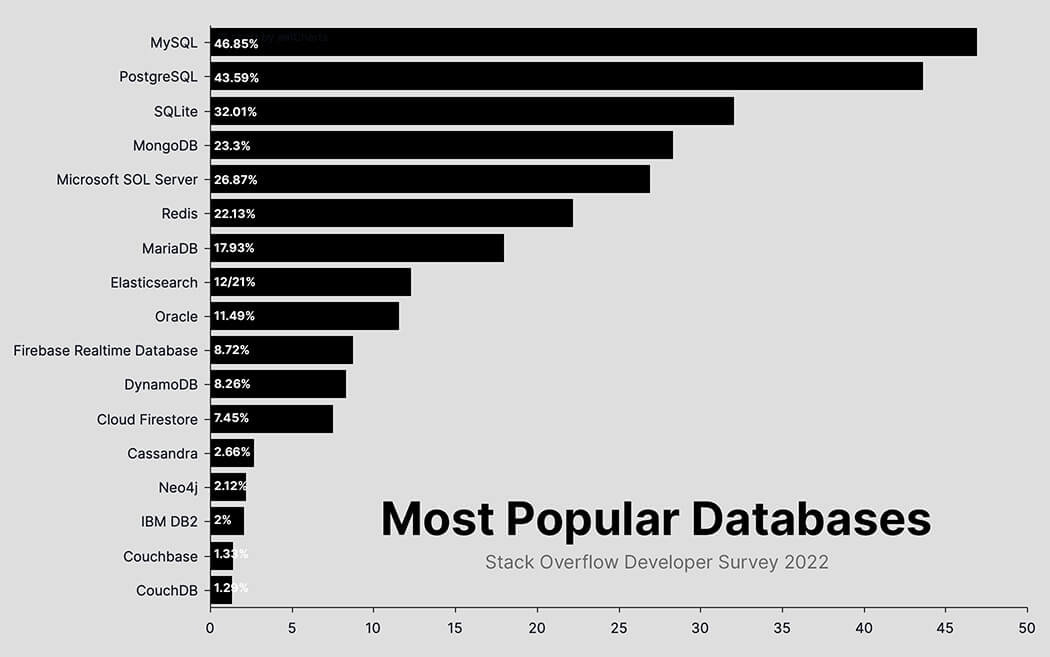In today’s digital world, web applications have become an integral part of our lives. From online shopping to social networking, we rely heavily on these applications to carry out our daily tasks. However, building a custom web app requires a lot of effort and planning, especially when it comes to choosing the right database.
The database is the backbone of any web application. It stores all the data, and it’s crucial to select a database that can handle your application’s data requirements, performance, and scalability. In this blog, we’ll discuss the different types of databases and the factors you should consider when choosing the right database for your custom web app.
Types of Databases:
Before we dive into the factors to consider, let’s take a quick look at the types of databases available for custom web app development.
- 1. Relational Databases: Relational databases are the most popular type of database used in web applications. They store data in tables with rows and columns, and they use SQL (Structured Query Language) to manage and manipulate the data. Examples of relational databases include MySQL, Oracle, and SQL Server.
- 2. NoSQL Databases: NoSQL databases are becoming increasingly popular in web application development. They store data in a document-oriented format and can handle large volumes of unstructured data. Examples of NoSQL databases include MongoDB, Cassandra, and Couchbase.
- 3. Graph Databases: Graph databases store data in nodes and edges, making them ideal for applications that require complex relationships between data points. Examples of graph databases include Neo4j and OrientDB.
Factors to Consider When Choosing the Right Database for Your Custom Web App:
- 1. Data Complexity: The first factor to consider is the complexity of your data. If you have a lot of structured data that requires frequent updates, a relational database might be the best option. On the other hand, if you have a lot of unstructured data or need to handle a large volume of data, a NoSQL database might be a better fit.
- 2. Performance: Performance is another critical factor to consider when choosing a database. Relational databases are known for their robust performance, but they can struggle with scaling to handle large volumes of data. NoSQL databases, on the other hand, are designed to handle large volumes of data and scale horizontally, making them ideal for high-performance applications.
- 3. Scalability: Scalability is essential for web applications that require growth over time. Relational databases can be challenging to scale as the number of users and data volume grows. NoSQL databases, on the other hand, are designed to scale horizontally, making them ideal for applications that require high scalability.
- 4. Security: Security is a critical factor to consider when choosing a database. You must ensure that the database you choose has robust security features to protect your data. Relational databases are known for their security features, but NoSQL databases are also becoming increasingly secure.
- 5. Cost: Cost is an essential factor to consider when choosing a database. Relational databases are typically more expensive than NoSQL databases, but they offer more robust features and performance. NoSQL databases are more affordable and can handle large volumes of data, making them ideal for small and medium-sized businesses.
Conclusion:
The developer survey results of 2022 from Stack Overflow reveal that developers are increasingly start using cloud-based databases and exploring newer options like graph databases and document stores. By keeping an eye on the latest developments in database technology, you can stay ahead of the curve and deliver exceptional custom web applications.

Choosing the right database for your next custom web app project is essential for the success of your application project. By considering the factors discussed in this blog, you can make an informed decision on the database that will best suit your application’s needs. Remember, each database has its strengths and weaknesses, and the key is to choose the one that aligns with your specific requirements of your project.
Need to build a custom web application?
With cross platform compatibility, web apps remain the ultimate medium for a product. Tell us about your project for a free consult.










